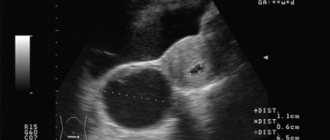Do all pregnant women feel sick in the morning?
Many women experience malaise and nausea in the morning and at other times of the day and outside of pregnancy, just as not all pregnant women suffer from toxicosis with nausea and vomiting. Manifestations typical of toxicosis are relatively subjective sensations; they are often caused not only by physiological changes, but also by a psychological component. “Pregnant” nausea is typical for the morning and first half of the day, usually occurs at the beginning of the first trimester and disappears without a trace by its end. This is the adaptation of the female body to new living conditions, changes in hormonal levels and reduced vascular tone.
Important
If the toxicosis is very painful, in addition to nausea, there is repeated vomiting, salivation is pronounced, and these sensations last after 10-12 weeks, without a tendency to decrease or disappear, a doctor’s consultation and examination are needed.
Often, pregnancy provokes an exacerbation of gastroenterological pathology (gastritis, ulcers, duodenitis, pancreatitis) and nausea refers to the manifestation of pathologies, and not the result of gestation.
Balanced diet during toxicosis
How to escape from toxicosis, what to drink? When morning vomiting occurs, food causes an unpleasant sensation. The stomach feels uncomfortable. Try to overcome your aversion to food, eat foods that you crave. Replenishing your body with essential nutrients is extremely important for you and your baby.
Most women feel better if they eat small, frequent meals. Rusks or crackers will help curb your hunger. Try not to eat fatty and spicy foods, stick to a healthy diet. If you want to eat, do it even at night. Choose easily digestible foods high in protein and carbohydrates.
Include healthy foods and healthy products in your menu:
- dietary meat – turkey, rabbit, chicken;
- fermented milk products – fermented baked milk, low-fat kefir, yoghurts, cottage cheese;
- fresh vegetables - broccoli, zucchini, cucumbers, tomatoes, celery;
- fruits - bananas, apples, pomegranate;
- cereal porridge;
- some kind of freshly squeezed juices.
Drink a glass of water in the morning. Drink your daily fluid intake throughout the day. In the early stages of pregnancy, herbal teas with mint, chamomile, cranberry juice, homemade lemonade, and beet juice are useful. It is not recommended to drink grapefruit and orange drinks. They should be removed from the menu.
If you have toxicosis, do not eat sweet fruits on an empty stomach. They are full of simple sugars, easily absorbed, and quickly increase blood sugar levels, leading to reactive hypoglycemia due to excessive insulin production. Eating sweet fruits as dessert after meals is much healthier.
Eat what you love, try to make a menu of healthy, wholesome foods. You nourish your body and the growing baby inside you.
Why does nausea and toxicosis occur?
Science does not yet know exactly the reasons that provoke nausea in pregnant women and toxicosis as such. Thus, the palm in this matter is given to the influence on the vomiting center of the brain of the altered balance of hormones, such as estrogens, progesterone, hCG (chorionic gonadotropin), as well as changes in the ratio of thyroxine (thyroid hormone) in the plasma. Exceeding the concentrations of these hormones can irritate the vomiting center, provoking attacks of nausea and single vomiting. Usually, as the body adapts to pregnancy at about 13-14 weeks, all these phenomena, along with ailments and weakness, disappear without a trace.
Interesting fact
It has been noticed that in mothers who are expecting twins or triplets, the severity of toxicosis is more severe due to the fact that the concentrations of hormones in their plasma are even higher than in singleton pregnancies.
In addition to the influence of hormones, some other theories have also been proposed to explain the occurrence of toxicosis.
When to see a doctor for nausea
Malaise during pregnancy is a common occurrence. You can fight at home. What kind of vomiting should you be concerned about? List of signs that require immediate hospitalization and treatment under medical supervision:
- You experience excessive nausea and vomiting (all day long).
- Due to nausea and vomiting, we lost more than 2 kg.
- Frequent vomiting is accompanied by fever; the temperature cannot be brought down.
- Brown vomit occurs, and traces of blood begin to appear.
- Heart palpitations at night.
- You feel very unwell.
- Vomiting persists in later stages (at the end of the second and third trimester).
- At the 9th month, frequent vomiting appears.
Take care of yourself. Pay close attention to changes in how you feel. Lead a correct lifestyle so that the entire period of pregnancy passes without nausea and without vomiting. Being pregnant and expecting a child is a real happiness that only a woman can experience!
With the conception of a child, a lot of processes occur in a woman’s body to preserve the fetus, resulting in nausea during early pregnancy.
In fact, the embryo is a foreign element, which is due to the fact that it has fifty percent of unknown chromosomes that are inherited by the child from the father.
Theories of the origin of toxicosis and nausea
If we consider nausea as a manifestation of toxicosis, there are a number of theories in its development:
- Some scientists blame an immunological factor for the development of nausea. The fetus consists of half of the father's genes, half of the mother's, that is, half of the cells of its body are foreign to the mother. Therefore, her immune system can aggressively perceive the tissues of the fetus, which can provoke ailments and deterioration of well-being, nausea. As the immune system adapts and tolerance to fetal tissues develops, nausea gradually disappears.
- From the point of view of psychological theory, it is believed that the new state of pregnancy for a woman is a special test for the body, including from a psychological point of view. Not all women are mentally prepared for motherhood, which can lead to anxiety and increased anxiety. As a result of this, stress nausea and malaise, symptoms of toxicosis, are formed.
noteIn those women who strongly anticipated and desired pregnancy, according to research, the manifestations of toxicosis are less pronounced.
- Based on the theory of general somatic health, the appearance of nausea and vomiting in many women is due to poor health in general, and the digestive system and liver in particular. In addition, nausea occurs more often in women of asthenic constitution, who are always losing weight and exhausting themselves with diets. If nausea in pregnant women is provoked by travel in transport and motion sickness, this may be a problem with the vestibular system.
- Experts also highlight the vegetative theory of toxicosis, associated with the adaptation of internal organs and nervous tissue to pregnancy, the theory of age, according to which older pregnant women and those who are carrying more than their first baby feel more sick. Let’s add here the hereditary characteristics of the course of pregnancy, typical for the entire female generation, starting with the grandmothers, mother and sisters of the pregnant woman, if everyone suffered from severe toxicosis, the risks of its development in this situation are also high.
- A number of experts claim that nausea can develop in a pregnant woman due to the fact that the receptors of the nose, pharynx, and tongue react in a special way to smells and tastes. Many expectant mothers report attacks of nausea from the strong smells of soap, cosmetics, and certain foods and dishes.
Why and when do pregnant women experience nausea?
The appearance of toxicosis is caused by a whole chain of factors: the fetus, attaching to the endometrium of the uterus, begins to grow and develop, which causes a real hormonal “storm” in the mother’s body, and affects both her physical and mental state.
Additionally, the pregnant woman’s non-compliance with the regime prescribed by the doctor from the day of registration has an impact: giving up alcohol and smoking, non-compliance with sleep and rest, problems with nutrition, worries about any reason.
How long does nausea last during pregnancy?
Unfortunately, it is not possible to answer this question in advance. We'll have to monitor it in practice. If you didn’t have a feeling of lightheadedness while carrying a child, you are truly lucky. There is no clear time frame for the development of nausea, but, according to medical statistics, in 80% of cases it appears in the first trimester: from 5 to 12 gestational weeks. In the first weeks, it is considered normal if vomiting occurs up to 5 times a day. In the second trimester, the number of vomiting attacks should decrease and, if there are no other ailments, this is not dangerous. If toxicosis does not slow down in the second trimester, be sure to ask a doctor for help, since this is not a good sign. Vomiting in the third trimester is simply dangerous and is a sign of gestosis. This is a dangerous condition in which the patient will most likely be admitted to the hospital under maintenance drips.
When does nausea occur during pregnancy?
Nausea most often develops from the early stages of pregnancy, and usually its first manifestations should be expected around the 5-6th week . In women with multiple pregnancies, symptoms may occur 1-2 weeks earlier and last longer.
Important
If the expectant mother has diseases of the digestive system, somatic pathologies, manifestations of toxicosis with nausea will be more pronounced and prolonged.
According to experts, the earlier toxicosis began and the stronger the nausea and vomiting, the longer it will take to manifest itself.
Nausea and vomiting deserve special attention as late-term manifestations of toxicosis. They can last until childbirth and often occur due to increased pressure, swelling and the formation of manifestations of gestosis; such manifestations are dangerous to health and require immediate medical attention. Often, nausea during gestosis weakens somewhat after the stomach drops by 37-38 weeks or decreases slightly after 35 weeks of pregnancy.
Mostly such manifestations in pregnant women occur during fasting, when the stomach is empty, so it is recommended not to take long breaks in eating.
First aid for nausea and vomiting
At what stage of pregnancy are you more likely to feel sick? Feeling nauseous is a natural occurrence during the first three months of pregnancy. To eliminate the symptoms of illness, try folk remedies that have been proven over the years.
What to take against nausea:
- Constantly rinse your mouth with infusion of chamomile flowers, oak bark, and sage. Rinsing reduces salivation and creates an astringent effect. Carry out the procedure three times a day.
- Prepare a decoction of dried fruits, without sugar. Drinking helps with nausea and will help stop vomiting.
- When vomiting, eat fresh red rowan berries.
- Mint and lemon. Steam a slice of lemon and 2-3 mint leaves with water; the drink will help cope with the feeling of malaise. To prevent nausea, take mints for a walk.
- Motherwort, valerian officinalis. Herbs will calm the nervous system, relieve stomach cramps, and help with vomiting so that it goes away.
- Try taking ginger tea. This is a salvation for expectant mothers from feeling sick. Ginger has a number of positive effects on the human body, including digestion.
Use medications, droppers, tablets when absolutely necessary. Medicines are prescribed individually by the attending physician. Strictly follow the recommendations and instructions for medications. Beware of frequent vomiting in the second and third trimesters. This indicates illness, poisoning. If toxicosis with vomiting lasts more than 24 hours, you should seek medical help. There is a danger of dehydration and the baby may be born prematurely. To reduce the risk, such toxicosis must be treated inpatiently.
Features of nausea during early pregnancy
Nausea often accompanies the initial stages of pregnancy, but is not one of its mandatory manifestations. You should not judge only by the presence or absence of morning nausea or vomiting that a baby has appeared in the uterus . Often, the first manifestations occur soon after two lines appear on the test, closer to 5-6 weeks, and are often combined with vomiting, severe salivation and distortion of taste and smell.
note
The appearance of nausea in the first trimester is a completely normal phenomenon; it does not require visiting a doctor, provided that the manifestations do not greatly disrupt the usual life and do not change the usual rhythm. If vomiting is also typical with nausea, repeated and not only in the morning, with toxicosis a woman suddenly loses weight - this is already a reason for examination and treatment.
Important facts about nausea during pregnancy:
According to doctors, those women who have had abortions in the past, suffered from inflammatory processes of the genitals or endocrine pathologies are more likely to suffer from early toxicosis, and they tolerate them more severely.- The presence of nausea indicates the development of the fetus in the uterine cavity, and often a sudden cessation of nausea and vomiting can be one of the indirect signs of a frozen pregnancy or the beginning of a miscarriage.
- Data that mothers of boys are more susceptible to toxicosis than those who carry a girl have not been scientifically confirmed.
Nausea, drooling, appetite
Factors that provoke nausea:
- Most often, nausea occurs in the morning, but in the daytime and evening such sensations are not excluded, although they are not so strong.
- Increased nausea can occur with sudden rises from bed, due to a decrease in pressure, which also threatens dizziness and a feeling of weakness and darkening of the eyes.
- Strong odors or foods (meat, fish, boiled vegetables) can provoke lightheadedness and nausea.
Each expectant mother has her own characteristics during toxicosis; heartburn and belching, an unpleasant taste in the mouth or a feeling of bad odor may occur against the background of nausea. Against the background of nausea, you may crave certain foods (sweets, salty foods, chalk, lime). In general, mild toxicosis indicates the progression of pregnancy and the full development of the fetus. But a completely normal phenomenon is also considered to be the almost complete absence of toxicosis or its mild manifestations, which are not permanent and do not interfere with normal life.
Important
If, against the background of toxicosis, you suddenly suddenly feel better, or a pulling sensation appears in the pubic or lower back area, this may indicate a threat of miscarriage or a frozen pregnancy. It's better to see a doctor!
When to ask for help
If you have moderate nausea and slight vomiting, no additional tests are needed. But if your symptoms worsen, you are unable to eat, or you experience weight loss, you should consult a doctor. A urine test, especially for ketones, a blood test, and sometimes an ultrasound should be performed.
Other warning signs:
- repeated vomiting, especially with blood;
- diarrhea and abdominal pain;
- pelvic pain and muscle spasm;
- signs of dehydration, infrequent urination and dark urine;
- temperature.
Nausea in the second half of pregnancy
note
If nausea occurs in the second or third trimester, this is not a manifestation of toxicosis. This is usually how gestosis manifests itself, a serious complication of pregnancy, as well as pathologies of the digestive tract and systemic diseases, and various other health problems.
Due to the growth of the uterus, compression of the walls of the stomach occurs and a change in its location relative to its usual position, as well as a change in the position of the intestines, bile ducts, liver and other internal organs. Evacuation processes and peristaltic contractions may be slowed down, leading to digestive problems (constipation, nausea, heartburn). Due to changes in posture and fullness of the stomach, part of the food with gastric juice is thrown into the esophagus, forming heartburn, which can also provoke attacks of nausea and malaise. Typically, such attacks of nausea associated with digestive disorders occur after 28 weeks of pregnancy, with a fairly large abdomen and a high position of the uterine fundus.
In the third trimester, nausea can be triggered by the development of preeclampsia and eclampsia due to increased blood pressure and headaches, impaired perception of sounds and light, and convulsions . This condition is dangerous to health and requires immediate hospitalization and a solution to the issue of delivery.
Often, nausea can be associated with a full stomach and its overdistension, weakening during fasting. This leads to the fact that a woman switches to eating frequently and in small portions, with dietary restrictions on fatty, spicy or fried foods. The sensations decrease or disappear very shortly before childbirth, when the abdomen lowers and breathing and digestion become easier.
Why do you feel sick during pregnancy?
Immediately after conception, the body is rebuilt - it increases the production of hormones, prolactin and estrogen itself, and there is a shortage of vitamins and minerals, the reserves of which must be constantly replenished. Susceptibility to fatty foods and various negative stimuli increases. Another reason that leads to the fact that the expectant mother feels very sick after eating during pregnancy in the morning, during the day, in unventilated rooms, before breakfast is the work of all sense organs, the stomach, the digestive system, and other internal organs in an enhanced mode.
In the early stages
The reasons why you may feel sick in the first trimester of pregnancy up to 11–12 weeks inclusive vary. The feeling of discomfort is caused by:
- pathologies of the thyroid gland;
- poor, unhealthy diet, including large amounts of fatty and junk food;
- deficiency of vitamins, minerals and trace elements;
- an increase in the amount of estrogen, thyroxine, prolactin, human chorionic gonadotropin;
- hormonal imbalance;
- hereditary predisposition;
- weak immunity;
- dysfunction of the vestibular apparatus;
- age over 30 years.
In the later stages
Nausea during pregnancy in the second, third and fourth trimesters often goes away as the body gets used to the fetus and hormones begin to subside. If the feeling of discomfort does not disappear, but the number of vomiting does not exceed 10 times a day, there is no need to worry. You need to sound the alarm if the expectant mother feels sick and vomits constantly. Such symptoms indicate that gestosis has begun, a complication of pregnancy. Other signs indicating a pathological condition:
- swelling;
- increased blood pressure;
- loss of protein in urine,
- convulsions.
Articles on the topic
- Low blood pressure during early pregnancy - why hypotension occurs and methods of treatment
- Dental treatment during pregnancy - when and how it is safer to do it, contraindications and restrictions
- Polyhydramnios during pregnancy - signs and why it occurs, diagnosis, drug therapy and nutrition
Preeclampsia is characterized by the development of deep disturbances in vital systems and organs. It begins to develop after 26-28 weeks, in frequent cases it is the main cause of complicated childbirth, and can lead to the death of the mother and the death of the fetus. Preeclampsia is classified into:
- clean;
- combined.
Vomiting in the last weeks of pregnancy can also occur for other reasons. Regardless of what caused the discomfort and how intense it is, you need to urgently see a doctor to rule out complications. The main reasons for nausea during pregnancy in later stages are the following:
- increased acetone in the blood;
- pathologies of internal organs - esophagus, heart, stomach;
- diabetes;
- renal failure;
- infectious diseases of the reproductive system;
- excessive nervous tension, fatigue, stress;
- diseases of the nervous system;
- malposition;
- food poisoning;
- preparation of the uterus for childbirth, its opening.
How to get rid of nausea during pregnancy?
There is no single and correct advice on how to get rid of nausea during pregnancy; each woman in this situation is helped by her own, individual set of recommendations and methods.
Non-drug ways to combat nausea and vomiting
There are time-tested and most effective, yet safe methods of combating nausea and toxicosis:
First of all, you need to give up bad habits and lead a healthy lifestyle, sticking to a daily routine and getting enough rest.- Frequent walks, frequent meals in small portions, breakfasts and all other meals, balanced in calorie content and composition, will be useful.
- Honey, dried apricots, and bananas taken on an empty stomach help reduce nausea.
- It is important not to eat very hot foods, fatty, spicy, fried foods.
- If you feel sick in the morning, you should prepare crackers and water in advance, taking them before getting out of bed, this will help cope with an attack of malaise.
- It is useful to take knee-elbow positions several times a day so that the uterus puts less pressure on the digestive organs and does not lead to nausea.
- You should sleep on your left side, placing a small pillow or cushion under your feet.
Drug correction for nausea in pregnant women
Important
Most anti-nausea medications are prohibited for use during pregnancy; anti-emetic tablets and injections are used only in extreme cases in a hospital with indomitable vomiting and severe weight loss.
If you feel very unwell and if the nausea does not go away by the end of the first trimester, the doctor will prescribe an examination, based on the results of which a diagnosis will be made and treatment will be prescribed. Sometimes nausea is caused by the presence of bile pigments or ketone bodies in the blood. In rare cases, the cause of nausea and vomiting may be a food allergy or intolerance to certain foods. In treatment, doctors use some types of drugs:
- Vitamin and restorative, mineral supplements
- Short course sorbents
- Antihistamine therapy for suspected allergies
- Hepatoprotectors, natural choleretic agents
- Sedatives in combination with psychotherapy
- Physiotherapeutic treatment.
Regarding herbal preparations and traditional medicine, doctors have different opinions; many consider them ineffective and dangerous during pregnancy, others say that reactions to them are individual and not everyone is helped by certain decoctions. They can only be used after consulting a doctor.
Alena Paretskaya, pediatrician, medical columnist
5, total, today
( 187 votes, average: 4.57 out of 5)
Symptoms and treatments for tonsillitis during pregnancy
Conjunctivitis during pregnancy: symptoms and treatment
Related Posts
When does toxicosis begin and go away during pregnancy?
Morning sickness is the first sign of pregnancy. It can be morning or evening. Usually it starts at week 5-6, lasts until week 12 - this is early toxicosis. Each case is individual. Morning sickness does not harm either mother or baby. Feeling unwell goes away in the evening. Many doctors say that morning sickness is a good sign. This means that the placenta is developing well.
Three degrees of toxicosis:
- Vomiting begins in the morning and is repeated 5 times after each meal. A pregnant woman's appetite worsens and weight loss occurs. The stage is not dangerous to health.
- The number of gag reflexes increases. There is significant weight loss, rapid heartbeat, and increased body temperature.
- Profuse vomiting occurs. The cause may be hyperemesis gravidarum. The disease can harm mother and baby.
More than half of women feel sick during pregnancy. The first trimester is often accompanied by toxicosis; it is called early. During the second pregnancy, symptoms of toxicosis may be absent.
The essence of pathology
So, in general, signs of toxicosis in the early stages are the norm, as the body adapts to the birth of a fetus in the womb. It should be noted that these adaptations occur at a very high speed, which results in nausea during pregnancy. There are expectant mothers who do not feel any signs of toxicosis at all, and this is not something outside the norm. This state of affairs is just a happy coincidence, and not a sign of any pathology. It is worth saying that if nausea does not go away after pregnancy, you should urgently seek help from a gastroenterologist.
In medicine, toxicosis is considered to be a pathology, even its most harmless manifestations. In other words, even nausea during early pregnancy is a pathology. It is worth highlighting that people generally consider nausea, vomiting and excessive salivation to be signs of toxicosis in the early stages, but in medicine there is a different opinion about toxicosis. In any obstetric textbook, signs of toxicosis are any pathological changes occurring in the body of a pregnant woman.
In addition, toxicosis is mainly caused by increased levels of progesterone in the body. This hormone is necessary to have a relaxing effect on the uterus and is produced in the ovaries after conception and the beginning of fetal formation. It should be noted that the body treats the fetus as a foreign object due to the fact that half of the embryo’s chromosomes are unfamiliar to the body.
It is worth mentioning that in the world most people believe that nausea and vomiting during pregnancy are mandatory processes. Especially if there is a delay in the monthly menstrual cycle. Typically, nausea and other signs of toxicosis appear 6 weeks after conception.
How to deal with nausea?
The idea that toxicosis stops bothering you by week 12 makes life easier for pregnant women, because sometimes nausea is very pronounced. Vomiting occurs up to several times a day, and sometimes at night.
In some cases, doctors even recommend inpatient treatment. This is due to the fact that nausea and profuse vomiting cause dehydration and imbalance of minerals, which can affect the well-being of the expectant mother and the development of the baby. But in fairness, it should be noted that severe cases of toxicosis are not common.
Video:
If attacks of nausea during the first months of pregnancy are within the normal range, then dealing with them is quite simple.
All you need to do is follow a number of simple rules:
- eat regularly, because nausea occurs much more often on an empty stomach;
- It is best to eat food in the morning right in bed. In this case, after breakfast, the right decision would be to lie down for a while;
- You can relieve nausea by switching to split meals: you need to eat once every 2-3 hours, but in small portions;
- You should refrain from eating fried, smoked, spicy and overly salty foods. They can cause digestive problems;
- during the period of exacerbation of toxicosis, there is no need to make sudden movements or bend over - this can lead to vomiting;
- The right method to combat the onset of nausea can be to fulfill the body's desires. In other words, you need to eat whatever you want. As a rule, expectant mothers are not tempted to eat something harmful;
- it is necessary to ventilate your home and walk outside as often as possible;
- Excessively cold and very hot dishes should be excluded from the diet of pregnant women;
- The best remedies for nausea are salty and sour foods, such as apples, sauerkraut, pickled or lightly salted cucumbers, dried fruits, ginger and pomegranate.
During pregnancy, it is necessary to completely abstain from smoking (including passive smoking) and drinking alcohol: not only can this harm the fetus, alcohol and nicotine increase toxicosis.
Traditional methods can also come to the aid of expectant mothers in combating the symptoms of toxicosis. The most popular of them include: mint and lemon balm infusions, green tea and lollipops.
Women preparing to become mothers should remember that severe nausea during pregnancy is a reason to consult a specialist, that is, a doctor.
As a rule, the doctor prescribes a special diet. If changing the diet does not have an effect, and vomiting occurs more and more often, the woman will be admitted to hospital treatment.










